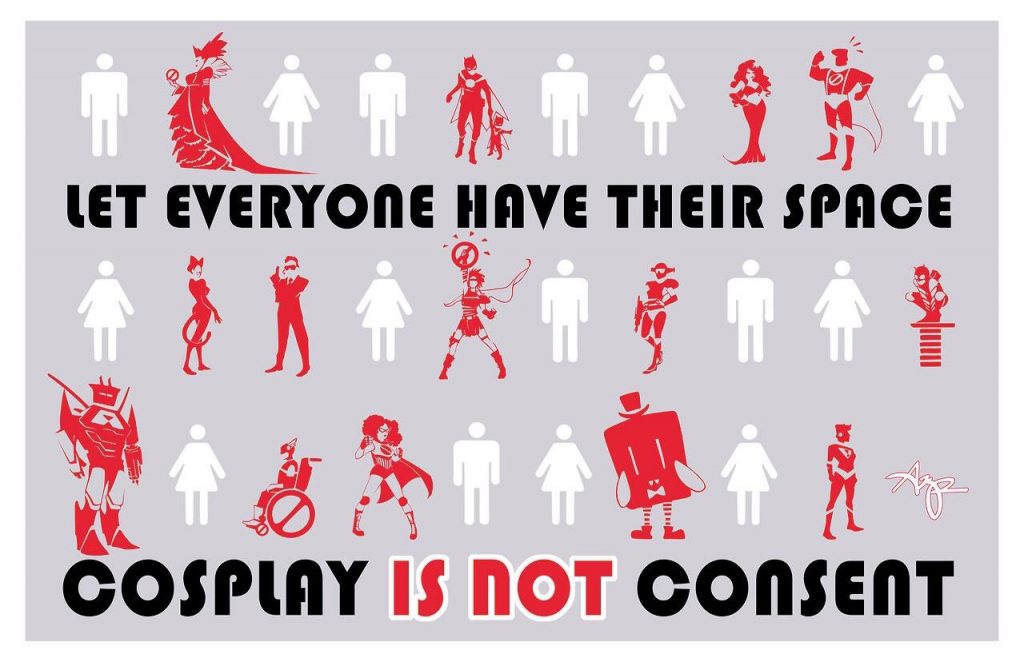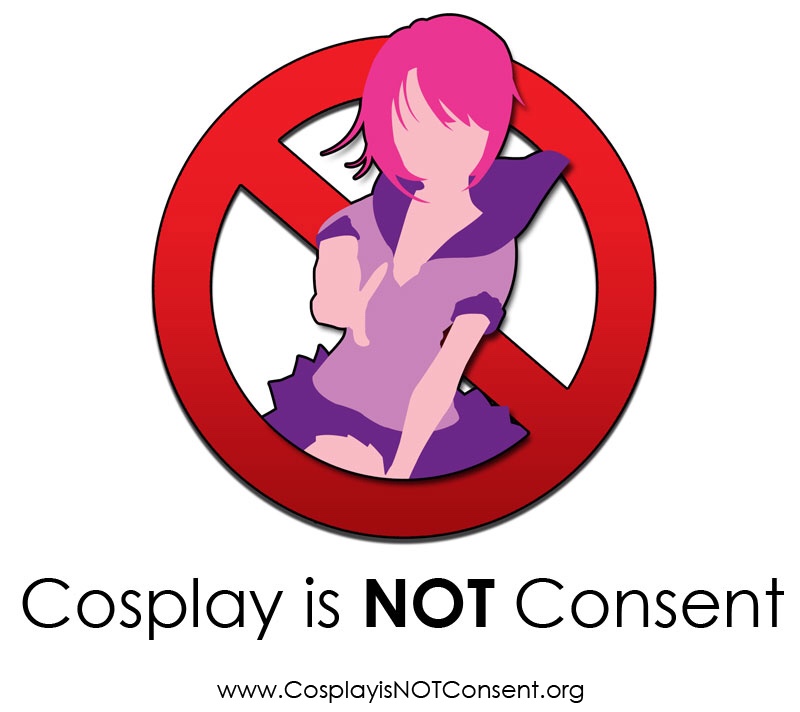
The Cosplay Community as a whole is an incredibly open and welcoming place, everyone mucking in together to build a creative space where people can enjoy their hobby. But there are so still a lot of problems with social issues – sexism, racism, sexual assault and body shaming being the most obvious amongst them.
The Cosplay Community as a whole is an incredibly open and welcoming place, everyone mucking in together to build a creative space where people can enjoy their hobby. But there are so still a lot of problems with social issues – sexism, racism, sexual assault and body shaming being the most obvious amongst them.
Cosplay is not a bubble of its own where these issues do not exist, where you can get away with certain comments and behaviours because you are in costume, or because someone else is in a costume.
To allow the idea of making the excuse for such behaviour, claiming “It’s just cosplay”, is as bad as allowing people to brush things off as a joke or saying “I didn’t mean it”. It would be better to think that certain language or behaviours aren’t OK and using them makes people uncomfortable, or upset.
Within cosplay, especially, there is an obsession with costume being the be all and end all of what is important, and often, people can’t see beyond that to the wider connect of what they are doing or saying. More and more dialogue is being opened about this across the board, be it in relation to sexism, racism, transphobia or other issues, and I believe that we need to continue to have these conversations to make sure that why these things hurts people is understood by the whole community.
Sexism and Sexual Assault
Yo, guys, just because women got the vote and can work now doesn’t mean sexism ain’t a thing – and it is alive and well in the cosplay community. Geek culture is as much in need of #metoo as anyone else – and cosplayers suffer a lot at the hands of internet trolls and worse both online and in real life.
A lot of girls/AFAB people get abuse hurled at them on social media from men, predominantly those who do not cosplay themselves, making comments about their bodies, their perceived attractiveness or lack thereof, about the sexual things that these men want to do to them. That they should be cosplaying as certain characters to be more appealing to men, for example, or that they are sluts and teases for being comfortable to cosplay as characters that are sexually appealing and are enjoying that element of their own sexuality.
I could honestly list so many things that have been said to myself or my friends over the years that I would never, ever repeat.
Many men, behind the anonymity of the computer screen believe that they can say or do whatever they want to women online, and cosplayers often get the full force of this. Being dressed as fictional characters seems to weaken the barrier of appropriate behaviour even more, as these comments often move from the keyboard to reality at conventions or events.
This behaviour, these comments, is all about power and control, wanting to control these cosplayers and be catered to by them – because these men think that women owe them something. Not to play to a stereotype, but if you have been in a predominantly male coded world like comics for your formative years, these is a likelihood that the only women that some really interacted with as teenagers as their personalities developed were the characters that cosplayers are now dressing up as.
In some cases, probably many, there is a sense of obsession and ownership over these characters; despite the fact that they are not entitled to that in any way, simply because they have consumed the media that these female characters are from. Therefore this thought process leads to some men feeling that the cosplayers must also be their possessions to control and demand things of.
In the past, and to some extent this continues in some comic forms, particularly superhero comics, these characters have been drawn and created by cis-men for cis-men to be “perfect women”. (Cisgender is a term for people whose gender identity matches the sex that they were assigned at birth). So this means that a lot of these men then see cosplayers as being the same thing: fictional playthings to think about and treat however they want.
There is a very, very large difference between a drawing of a woman by a man, dressed a certain way and a real life woman, presenting herself how she so chooses. One is catering for men – and one is doing it for themselves in whatever way that may be.
I’ll let you work out which one is which.
It is also very possible that a lot of these people making these comments are just arseholes who think that they can say awful things to women because they are misogynists. So. There’s also that.
There is also a worrying amount of sexual assault happening at cons. Cosplayers having their arses grabbed, strangers shoving their faces into their chests (this one has happened to multiple of my friends), up skirt shots with selfie sticks, and some more serious allegations of assault. So much of this is seen as normal at conventions, that cosplayers are regularly put in the position of having to give each other advice on how to deal with this behaviour, and what to do when it happens (yes, when – not if).
 Conventions are starting to do something about it, Cosplay is Not Consent posters and policies are being seen more and more but often, these things happen so quickly or, in the cases of things like up skirt photos, aren’t seen at all, that it’s hard for conventions to police it as well as they would like.
Conventions are starting to do something about it, Cosplay is Not Consent posters and policies are being seen more and more but often, these things happen so quickly or, in the cases of things like up skirt photos, aren’t seen at all, that it’s hard for conventions to police it as well as they would like.
The thing that really does seem to be making a different in this area though is both online education and “calling out”. This may sound like it wouldn’t do much, but once one person has said something has happened, another is brave enough to do the same, and then another, much like cosplays very own version of #metoo.
The more people say that they have been assaulted or had sexual comments said to them online or in person, the more the community and, in turn, the extended community of conventions, events, photographers, and even media creators, take it seriously. It has meant that people who in the past have gotten away with what they were doing have now had to actually deal with some form of consequence via social and community justice.
The most recent, and infamous, example of this is type of behaviour features a someone from within the cosplay community itself. In early July 2018, a popular cosplayer was accused of sexual harassment by several people online.
From what has been gleaned of these alleged assaults, and we choose our words carefully here because, despite one particularly well-circulated video and discussion in online groups and forums,, no legal action appears to have been taken against this person, it’s believe that the cosplayer might consider their actions standard behaviour within the cosplay scene, due to this having being normalised in their bubble.
The community does seem to have black listed them for the most part and made something of an example of them as a result of their alleged activities, in the hope that others will learn and not follow in this cosplayers footsteps.
However it is still worrying.
If, for example, a well-known Cosplayer thinks sexual harassment is normal behaviour, and there have been well documented instances of such activity this year alone in one case, does that mean that the majority of people engaging with Cosplay assume this is normal, and therefore will continue in this way?
We can hope not, and the community is now going out of its way to counteract these ideas and to make sure that everyone understands the need for consent, no matter what they are wearing. Unfortunately, for the most part, this is only word of mouth education and there is no way to make compel people to engage with, and take the Cosplay is not Consent message on board.
In reality, the best thing that can be done is for convention organisers and organisations to become much more involved, especially when assaults are mostly happening at these events.
One thing that conventions can do is to make themselves more accessible for people needing to report inappropriate behaviour and sexual assault with staff whose job it is to deal with these claims. Of course this isn’t an easy undertaking, but if a convention to wash its hands of a sexual assault claim rather than deal with it and, if needs be, pass it on to the police, then that does not give anyone much confidence in that event.
Several conventions have banned people for violent threats against attendees both at the show and online beforehand, so why not do the same for sexual assault or rape threats? If they create a safe environment where things can be reported and taken seriously, then community and the convention will flourish.
Overall, as a community, cosplayers do have each-other’s backs, but we need more. Often, the online threats and comments come from outside of our community, from people who see cosplayers as sexual objects, the same as images in a comic book, so we need conventions, media creators, websites and the rest to say something just as much as we are. It’s been said so many times, by so many people – but just don’t let these things pass as banter or jokes or “locker room” talk.
I’m sorry that we have had to go into such a heavy subject, and I’m sorry that we will continue to talk about the less fun side of cosplay in my next few pieces. The only way we can make sure that Cosplay is fun, is if we talk about issues that dog the community and try to combat them.
 Holly Rose Swinyard was once described as a 21st Century Marlene Dietrich… But if that film icon was British and a cosplay geek. A self-proclaimed fashion experimentalist and long-time cosplayer, Holly writes about their experiences working their through these two very eccentric worlds, and how they have found themselves through creating, crafting and cravats.
Holly Rose Swinyard was once described as a 21st Century Marlene Dietrich… But if that film icon was British and a cosplay geek. A self-proclaimed fashion experimentalist and long-time cosplayer, Holly writes about their experiences working their through these two very eccentric worlds, and how they have found themselves through creating, crafting and cravats.
• Follow Holly on Twitter @lilistprince | Instagram – @lilprincecostumes | Facebook | Blog | Patreon
• Holly is also the Editor of The Cosplay Journal, a new coffee table magazine which focuses on the diversity and craftspersonship of the UK cosplay community. You can check it out at www.thecosplayjournal.com
Web Links
A community intent on empowering fan convention costume enthusiasts (aka “cosplayers”) to speak against inappropriate social behavior of a sexual and/or stereotypical nature for themselves and fellow fans… cosplay is NOT consent!
• Cosplay is not Consent: The Documentary
Facebook page for the film directed by Joshua Raynor
One of many guest posts for downthetubes.
Categories: downthetubes News, Other Worlds
 Dark Horse, Hasbro, tease new Dungeons & Dragons, Magic: The Gathering projects
Dark Horse, Hasbro, tease new Dungeons & Dragons, Magic: The Gathering projects  Beano and Dandy figures offered galore in latest Auction Centre sale
Beano and Dandy figures offered galore in latest Auction Centre sale  Kevin O’Neill original “Torquemada”art up for auction
Kevin O’Neill original “Torquemada”art up for auction  theory11 Superman Playing Cards look ace
theory11 Superman Playing Cards look ace